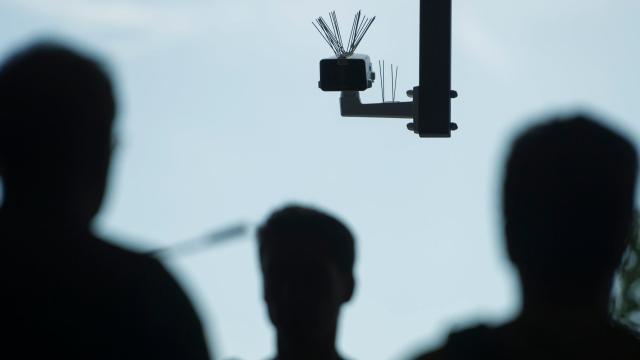America’s creepiest facial recognition company just suffered one of its biggest blows yet. As part of a settlement with the ACLU, Clearview will be “permanently banned, nationwide,” from selling access to its faceprint database to most businesses across the country.
Those sweeping restrictions are the result of a lengthy legal battle that will force Clearview to comply with Illinois’ Biometric Information Privacy Act (BIPA), which privacy experts claim offers some of the strongest protections in the nation.
“By requiring Clearview to comply with Illinois’ pathbreaking biometric privacy law not just in the state, but across the country, this settlement demonstrates that strong privacy laws can provide real protections against abuse,” Nathan Freed Wessler, Deputy Director of the ACLU Speech, Privacy, and Technology Project said in a statement. “Clearview can no longer treat people’s unique biometric identifiers as an unrestricted source of profit. Other companies would be wise to take note, and other states should follow Illinois’ lead in enacting strong biometric privacy laws.”
Under these new restrictions, Clearview can no longer sell its face data to most private entities nationwide, nor can it grant state or local Illinois law enforcement access to its services for the next five years. Clearview will have to maintain an opt-out request form where Illinois residents can request to have any images of themselves blocked from appearing in Clearview search results. Clearview will also have to commit to spending $US50,000 ($69,410) on ads to publicise that op-out form. The company will have to spend the next five years finding ways to filter out photos taken or uploaded in Illinois.
Notably, the settlement will reportedly force Clearview to end its practice of offering free trial accounts to police officers without their department or employers’ knowledge. Clearview’s U.S. clients reportedly include some 2,000 U.S. taxpayer-funded agencies, many of which are local law enforcement. What this settlement won’t do, is ban federal agencies and local police departments in states outside of Illinois from working with Clearview. That’s why the ACLU is says state legislatures or lawmakers in Congress have to push for similarly privacy-protecting laws for the effects of this settlement to be felt more broadly. Federal privacy legislation has also been stuck in the, “just around the corner” stage for years, by the way.
“A milestone moment for civil rights”
Privacy experts pushing back against what they view as Clearview AI’s pervasive overreach described the settlement as a type of watershed moment for consumer privacy.
“There is a battle being fought in courtrooms and statehouses across the country about who is going to control biometrics — Big Tech or the people being tracked by them — and this represents one of the biggest victories for consumers to date,” Edelson PC partner J. Eli Wade-Scott said in a statement.
“This is a milestone for civil rights, and the ACLU deserves our thanks for once again safeguarding our Constitution,” Surveillance Technology Oversight Project Executive Director Albert Fox Cahn told Gizmodo.
Clearview did not immediately respond to Gizmodo’s request for comment.
The ACLU settlement comes amid a growing chorus of calls from regulators and activists to rein in Clearview’s power. Earlier this year, a group of Democratic lawmakers sent letters to the Departments of Justice, Defence, Homeland Security, and the Interior urging them to cease using Clearview AI. In their letters, the lawmakers apocalyptically warned Clearview’s service could effectively eliminate the notion of public anonymity if left unchecked.
Clearview’s troubles aren’t limited to the U.S. either. The company faces five legal complaints filed by privacy watchdogs in France, Austria, Italy, Greece and the United Kingdom alleging the company violates European data protection laws. Australia, (where CEO Hoan Ton-That grew up) meanwhile took the biggest step by a country so far and forced Clearview to cease the collection of facial images and destroy any existing images and face templates collected from the country. A year prior to that Clearview was pressured into retreating from Canada following a pair of federal investigations into the business.
While Fox Cahn praised the settlement, he said its success nonetheless points to the need for more states, or even the federal government to pass privacy legislation similar to Illinois’ BIPA.
“Banning Clearview AI in one state is not enough; we need a national ban,” Fox Cahn said. “Illinois has long been ahead of the curve in protecting residents from biometric surveillance, but it’s time for the rest of the country to catch up. It’s only a matter of weeks before we start seeing police use technologies like Clearview AI to enforce bans on abortion. We shouldn’t allow this sort of technology to target pregnant people in any state.”
Editor’s Note: Release dates within this article are based in the U.S., but will be updated with local Australian dates as soon as we know more.
